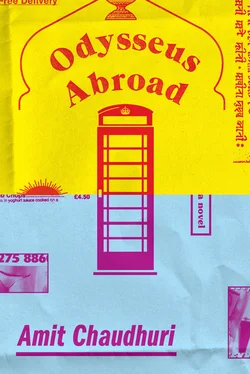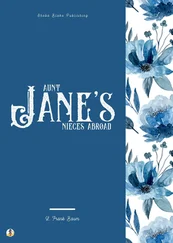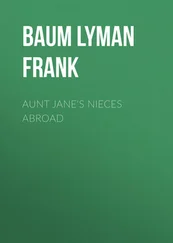He had a lisp — or not a lisp, really, but a soft way of saying his t’s that was both limpid and menacing. His girlfriend Cynthia stayed in the same room. She was Bengali, but from a family of Christian converts. Cynthia Roy. She was pretty and a little cheap-looking, with her bright red lipstick and simper and the thick outline of kohl, and with her sheep-like devotion to Vivek. Cynthia was a new kind of woman — a social aspirant, like her boyfriend — that Ananda couldn’t really fathom, especially the mix of characteristics: newfangled but unintellectual, independent but content to be Vivek’s follower. Anyway, Ananda barely existed for her. Someone had said she liked “tough men.” Vivek wasn’t taller than five feet seven or eight, but he was probably tough — because he was broad. In spite of his chains and aftershave, he had a swift, abstracted hammerhead air. Ananda had overheard him say “Fuck off, fuck off” to Walia, the landlord, after the payphone incident — uttering the admonishment in his calm musical manner (“Fukko, fukko”) to which Walia clearly had no answer. Walia had nevertheless reclaimed the payphone coin box and carried it downstairs and out of 16 Warren Street. But in all other ways he was toothless before Vivek Patel because Vivek’s father, an East African businessman, was an old contact of Walia’s. Patel Senior lived in Tanzania. From there, he’d sent forth two sons, Vivek and Shashank (who stayed in the single room next to his older brother), to study at the American Management School in London. Shashank looked like Vivek in a narrow mirror: he was slightly taller, paler, and a bit nicer. He spoke with the same lisp — which could have been a hallmark of Tanzanian Gujaratis. On his lips, it sounded guileless and reassuring. He’d told Ananda in the solemn way of one gripped and won over by a fiction that the American Management School offered genuine American degrees. This was the first time they’d discussed education and pretended to be high-minded students of a similar kind — to have different aims that somehow nobly overlapped and converged in this location, despite the signals to the contrary.
No wonder they don’t have to study. Besides, who comes to London to do management?
—
The dull pulse-like beat started at eleven o’clock at night. It was a new kind of music called “rap.” It baffled Ananda even more than disco. He had puzzled and puzzled over why people would want to listen and even move their bodies to an angry, insistent onrush of words — words that rhymed, apparently, but had no echo or afterlife. It was as if they were an extension of the body: never had words sounded so alarmingly physical, and pure physicality lacks empathy, it’s machine-like. So it seemed from his prejudiced overhearings. But down here he couldn’t hear the words — only the beat and the bass note. It wasn’t loud, but it was profound, and had a way of sinking through the ceiling into his body below. Each time it started, his TV was still on, and he’d allow himself to think, “It’s OK, it’s not so bad really, I don’t know why I let it bother me. I can ignore it.” This gave him great reassurance for a few minutes. But the very faintness of the pulse, and the way it caused the remotest of tremors — so remote he might be imagining it — was threatening.
He could cope with it while the lights were on; he could see it in perspective (how do you see a sound?) as one among other things. When he switched off the bedside lamp, the faraway boom became ominous. Its presence was absolute, interior, and continuous, erasing other noises. In a darkness outlined by the perpetual yellow light coming in through the curtains, he waited for sleep. But more than sleep, he waited for the next sound. That vigil subsumed questions that came to him intermittently, and which lacked the immediacy of When will they turn down the music? — questions like, What am I doing in London? And what’ll I do once I’m back in India? What do I do if I don’t get a First; will a 2:1 suffice? Of course I won’t get a First — no one does. When will the Poetry Review send me a reply? I’ve read the stuff they publish — chatty verses are the norm — and they should be struck (at least some lonely editor tired of sifting through dry, knowing poems by English poets) by my anguish and music. Such thoughts occurred to him during the day but were now set aside in the interests of following — in addition to the bass beat — the movements upstairs. These were abrupt and powerful, as they were when the Patels first woke up at midday, and separated by typical longeurs of silence — and immobility. The gaps were excruciating, because it was then that Ananda concentrated hardest, avidly trying to decide if activity had ended for the night. By now the music would be so faint that he’d have to strain to hear the dull electronic heartbeat. But strain is what he wanted to do; to devote, eyes shut, his whole imagination to this exercise.
—
It was odd. He hadn’t realised till he moved to this flat that floorboards could be so porous; and that this perviousness was an established feature of English coexistence. “But we were colonised by them,” he thought. “How is it that our cities are so different? How come I’m so little prepared for here?” He briefly sought but couldn’t find a connection between London and Bombay — except, of course, the red double-decker buses and postboxes. It made him ill at ease — over and above having to swallow the insult of having been ruled by this nation! A nation now in turmoil, with Arthur Scargill browbeating television anchors, and the indomitable grocer’s daughter unleashing policemen on horses on the miners. Ananda himself was barely aware that it was all over, that the red-faced Scargill’s time was up, and that his refrain, “At the end of the day,” had caught up with him sooner than you’d have guessed two years ago. Ananda was disengaged from Indian politics but dilettantishly addicted to British politicians — the debates; the mock outrage; the amazing menu of accents; the warmth of Tony Benn’s s’s and his inexorable fireside eloquence; the way he cradled his pipe; the wiry trade union leaders, blown into the void by Mrs. Thatcher’s booming, unbudging rebuttals. It was a great spectacle, British politics — and the actual participants and the obligatory ways in which they expressed disagreement (“That is the most ridiculous tosh I’ve ever heard”; “Excuse me, but I belong to a family that’s been working class for generations”) was even more entertaining than the moist nonsense that their Spitting Image counterparts regularly sputtered.
—
Class! He’d hardly been aware of it before coming to England — which was not so much an indication that it didn’t exist in India as of the fact that the privileged were hardly conscious of it, as they were barely conscious of history — because they didn’t dream they were inhabiting it, so much did they take it for granted. History was what had happened; class was something you read about in a book. Living in London, he was becoming steadily conscious of it, and not only of race, which was often uppermost in his mind. Who had spoken of the “conscience of my race”? He couldn’t remember. It sounded like a bogus formulation — probably some British orator, some old fart, maybe Winston Churchill. Then again, maybe not. Could it be a poet? Poets said the oddest things — odd for poets, that is. He’d discovered that the words he’d ascribed to some populist sloganeer and even, unconsciously, to Marx actually belonged to “A Defence of Poetry”; there, Shelley had proclaimed: “The rich have become richer, the poor have become poorer; and the vessel of the State is driven between the Scylla and Charybdis of anarchy and despotism.” How astute of Shelley to have noticed; and to have made that throwaway observation well before Marx made his advent into London! Marx had come here in 1846, and Shelley’s “Defence” was published in 1840, belatedly, nineteen years after it was composed; had the bearded one noticed it, picked it up, investigated — did Marx read poetry? Did he like poets? Certainly, it appeared to Ananda that, in England now, the rich had suddenly become richer — but he could be wrong; he was no good at economics; his sights were set on the Olympian, the Parnassian: especially getting published in Poetry Review . He had a notion that the poor were becoming poorer, though he didn’t connect this with the pit closures. His uncle had been made redundant. Serves him right. Poor man. But, if you thought about it, there was money about and people were celebrating it, the pubs in central London near his studio flat looked less despondent and ruffianly, they’d become smarter, even the curry as a consequence of this new financial self-confidence was in ascendancy, not the old spicy beef curry and rice he’d tasted first when he’d visited London as a child, nor even the homemade Indian food that left smells in hallways which white-skinned neighbours complained of, but a smart new acceptable curry, integer of the city’s recent commercial success and boom. Even before he’d journeyed to England this time, to start out as a student, he’d heard that money was flowing in from North Sea Oil. Lucky bastards. Lucky for Thatcher — like a gift to her from Poseidon, or whoever the appropriate god was (he was poor in Greek mythology). Poseidon had also given her a hand at the Falklands, a war the British should have lost if only because they were British — he was angry about that. Lucky island, with more than its fair share of windfalls, rewards, and fortune. In his own land, all three million square kilometres of it, they’d dug and drilled but couldn’t find a single vein of oil there, nor in the oceans surrounding its deceptively plump finger-like promontory from which Sri Lanka seemed to trickle off like a drop of water. This happy breed of men, this little world. This precious stone set in the silver sea. They were doing all right.
Читать дальше











